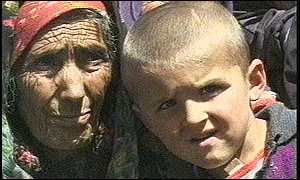Roof of the world' survival-1998-09-24
The people of the Pamirs are cut off from the rest of the world for months on end
An ambitious project is underway in the remote region of the Pamir mountains to help the mountain people fend for themselves.
For decades the mountain range, which is described by the Tajiks as "the roof of the world", was dependent on Moscow for survival.
But when the Soviet Union collapsed, the Aga Khan foundation stepped in to fill the gap. It is now trying to teach the people self-sufficiency.
In one of the most ambitious land reforms in Central Asia, the local authorities have agreed to break up the collective farms and train everyone in basic farming techniques.
Staving off starvation
The Aga Khan, who visited the region this week, is the leader of the world's Shia Ismaili community, and the spiritual leader of the Pamiris.
[ image: The Aga Khan received a warm welcome]
The Aga Khan received a warm welcome
In the early 1990s his foundation rushed thousands of tons of food aid up the steep mountain passes to stave off mass starvation, as the area found itself embroiled in civil war and without the millions of dollars of Soviet subsidies it had grown to depend on.
"When the central state collapsed, it was like from one day to another - total collapse. It wasn't like a gradual reduction of food - it just stopped. So you had a situation where the population was living reasonably well, schools functioning, hospitals functioning, things in the shops. And then suddenly stop," said a spokesman from the Aga Khan foundation, Najmi Kanji.
Without help from Russia, the people of the Pamirs were left with no industry and little ability to fend for themselves.
Breaking up collective farms
The challenge for the Aga Khan foundation and other charities has been to find a way for the people to break free from habits of dependency.
[ image: Almost nothing grows in some parts]
Almost nothing grows in some parts
But their task was difficult. In the town of Murgab, 4000m above sea-level, almost nothing grows.
The solution they have come up with has been to persuade the local authorities to break up the old collective farms and to convert the Pamiris - whether teachers or engineers - into farmers.
The hope is that by the year 2001 the Pamiris will be able to grow most of the food they need.
'More is needed'
But foreign donors say that much more is needed if the people of the Pamirs are going to rebuild their lives.
[ image: Everyone is to learn how to till fields]
Everyone is to learn how to till fields
British Ambassador Barbara Hay said: "There is a realisation that they have to take matters into their own hands. And they have to learn to grown their own crops and be farmers. But whether that's going to be enough to be able to sustain life is unpredictable."
The next challenge will be to break the isolation that cuts the barren mountains off from the rest of the world for months on end.
It is hoped that a new road will be opened soon to China, and another to western Tajikistan.
BBC World
- 5348 reads
 Ismaili.NET - Heritage F.I.E.L.D.
Ismaili.NET - Heritage F.I.E.L.D.